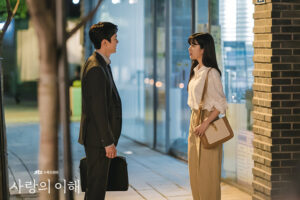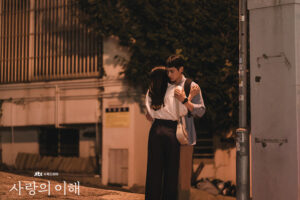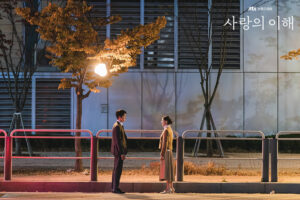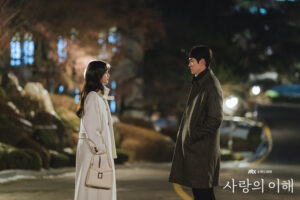
It’s rare that a drama stands out as different right out the gate, but even rarer that it fails to build on the momentum of its premise so quickly after it begins. Office drama The Interest of Love somehow manages to meet both criteria through a whirlwind rough patch of first few episodes, a stronger middle, and a head-scratching ending — all despite its initially promising setup.
This review contains spoilers.
Even though The Interest of Love can best be labeled as an “office” drama, it at first hardly meets the criteria of a typical office drama. Many, if not most, recent releases of this genre typically begin with an initial attraction or trope-y setup meant to spark an initial attraction between leads, followed by a long, slow burn in which they eventually end up together. Nearly all of The Interest of Love’s plot points and characters revolve around the fictional KCU Bank’s Yeongpo branch, focusing mainly on four of its employees and their relationships with one another. However, the romance between the two leads, bank tellers Ahn Su-yeong (Moon Ga-young) and Ha Sang-su (Yoo Yeon-seok) forms and is mostly at its height in just the first few episodes of the drama, leaving suspense and mystery for what could follow in the remaining episodes.
The drama kicks off with palpable romantic tension between the two characters, who have worked together at the Yeongpo branch for a few years. Su-yeong is technically Sang-su’s senior, although Sang-su holds a higher position than Su-yeong thanks to his college education and due to her lack thereof. Through longing gazes and constant glances in each other’s directions from across the bank’s desks, Sang-su’s and Su-yeong’s feelings for each other are made entirely apparent. In the first episode, Su-yeong is asked to travel to Jeju Island on business for one of the bank’s high-profile clients, and Sang-su volunteers to accompany her. The romantic tension between them grows significantly over the course of this day-long trip, giving the two the chance to connect one-on-one, which only increases their fondness for one another.
In the next few episodes, Su-yeong’s and Sang-su’s budding relationship builds, then crashes practically to the point of no return. This at first seems to be the entire point of the drama — to subvert the typical romance melodrama on its head by kicking off the plot with a strong romance and recapping its fallout or at the very least to emphasize the “will-they-won’t-they” aspect of the leads’ relationship with one another — but that premise gets completely lost as the drama continues.
Following Su-yeong’s and Sang-su’s Jeju business trip, the two go on a date to the movies. All seems to go swimmingly until Sang-su tells Su-yeong he likes her and asks her to get dinner with him, to which she replies that she does not like undefined relationships. He finds her response puzzling, given how much she seemed to enjoy herself on the date. Su-yeong eventually agrees to dinner, but ultimately, Sang-su stands her up and does not show up for initially undisclosed reasons. This early plot point again sets up an interesting premise, in which the writers give themselves the opportunity to eventually reveal to viewers why both of these characters appear to act one way but say otherwise, and vice versa, and explore the realities of people’s behavior when it comes to navigating romantic relationships in a workplace setting and modern-day world. However, they never seize that opportunity and make proper use of it.
Another interesting element is introduced when the second leads, bank security guard Jeong Jong-hyeon (Jung Ga-ram) and new-to-the-branch assistant manager Park Mi-gyeong (Keum Sae-rok) enter the mix and become romantically involved with Su-yeong and Sang-su, respectively. Shortly after Sang-su stands Su-yeong up for dinner, Su-yeong and Jong-hyeon become embroiled in a rumor at a team dinner by the branch’s other nosy employees that they are a couple, which they deny at the time. Sang-su becomes suspicious that the rumor is true after he sees Jong-hyeon hugging Su-yeong in front of her house (which is eventually revealed to be a complete mixup). A couple episodes later, Su-yeong and Jong-hyeon begin dating for real, and he eventually even moves into her apartment for most of the remaining episodes after he gets kicked out of his own in the same neighborhood as Su-yeong’s for missing his rent payments.

While Su-yeong and Jong-hyeon bond with one another over their shared financial struggles and similar lower class backgrounds, Mi-gyeong and Sang-su bond over their shared college experience. Early on in the show, the writers clarify that Sang-su is from a middle class background, but went to a high school with wealthy students because of his Gangnam address —even though he and his mother, played by Seo Jeong-yeon, who owns a massage parlor, lived in a basement unit. Mi-gyeong, on the other hand, comes from an extremely wealthy family and is the daughter of a CEO and one of the bank’s highest profile clients. She does not have a need to work as the other three characters do, but ultimately ends up at the Yeongpo branch because she is passionate about her work at the bank. Mi-gyeong and Sang-su quickly become close, as it is revealed that Sang-su was her senior at university, and eventually also start dating shortly after Su-yeong and Jong-yeon do too.
The introduction of these secondary characters into the leads’ lives brings about another promising narrative opportunity on top of the others already mentioned. With the emphasis on these four characters’ differing socio-economic backgrounds — which become even more apparent as the pairs begin dating — gives the writers yet another opportunity to explore another realistic facet of what causes relationships to both succeed and fail.
However, the writers only hang onto the contention that differing economic statuses and education backgrounds brings between the characters for mainly the middle of the drama, which is arguably its strongest narrative arc. At one point, while Mi-gyeong and Sang-su are dating, Mi-gyeong even goes so far as to buy Sang-su a new car, which especially creates awkwardness in their relationship as Sang-su refuses to accept the gift. On top of that, even as Sang-su continues to drop blatant hints to Su-yeong that he still likes her, Su-yeong continuously indicates that their relationship would never work since he went to college and comes from a higher socio-economic status than her. Sang-su disagrees, although it’s clear that Su-yeong’s concerns have some truth to it.
Ultimately, the writers drop the obstacles that arise through the characters’ differences in background in the second half of the drama in favor of telling a purely “will-they-won’t-they” story between Sang-su and Su-yeong instead.
While at first the constant push and pull between Sang-su and Su-yeong is exciting, and almost a return to the tension-filled first few episodes of the drama, it loses its suspense quickly. Sang-su and Su-yeong remain in their relationships with Mi-gyeong and Jong-hyeon until almost the very end of the drama, which makes their actions all the more questionable. At one point, while still in their relationships, they finally cave and tell one another they can’t be apart anymore, then share a passionate kiss on the ice rink where Sang-su plays hockey after work. Shortly after, Jong-hyeon asks Su-yeong if he truly loves her, to which she says yes, even though her actions toward both him and Sang-su clearly suggest otherwise. On the other hand, Sang-su breaks up with Mi-gyeong — something she saw coming giving her continuously witnessing how Sang-su interacts with Su-yeong at the bank. Mi-gyeong at first refuses to accept the breakup, although she ultimately accepts in a later episode, when they officially part ways.

Eventually, Su-yeong and Jong-hyeon do the same, but when this happens, Su-yeong at first inexplicably disappears. She finally has the chance to openly be with Sang-su, and earns a promotion through a transfer to another branch of KCU Bank. The two eventually reunite in Su-yeong’s hometown of Tongyeong, where she agrees yet again to get dinner with Sang-su as she did once before. However, like Sang-su once did, Su-yeong does not show up at dinner the next day.
By the last few episodes, several years have passed by and Sang-su and Su-yeong haven’t spoken since. By chance, Sang-su ends up handling a loan request from an art café that turns out to be Su-yeong’s. In the final few scenes of the drama, they recap what could’ve been had Sang-su shown up to dinner on that fateful night or had Su-yeong also shown up on the night in Tongyeong. Sang-su questions why their relationship ended up the way it did — was it just their interest in one another, or was it genuine feelings of love? They continue walking up the hill together, never answering the question, ultimately leaving no real closure as to why they both did (and didn’t do) what they did, leaving audiences wondering what may happen to the pair next.
While the drama’s ending is obviously unfortunate in the sense that Sang-su and Su-yeong don’t end up together, it’s arguably realistic considering they both never seemed to be sure what they wanted out of a relationship with one another in the first place. Ironically, even as Su-yeong first said that she doesn’t like undefined relationships, their relationship became more undefined as the drama progressed.
The writers never fully allowed viewers to get inside the minds of Sang-su or Su-yeong in order to understand why they didn’t get together at any point throughout the drama, why they began dating two different people they didn’t see a future with, why they were unfaithful to their partners and then continued to stay in those relationships, and why they ultimately never ended up together. Instead, the resolution reverts to a surface level reference to the title of the drama that feels anything but sincere, well-thought out, or even fully related to the events that take place throughout the rest of the show. The end result isn’t necessarily a matter of life circumstances or “interest” getting in the way, but ultimately these characters’ own individual decisions that led them away from what they initially wanted and down different paths. However, there was no clarity, or character growth either, to explain why they did what they did, leaving for an unsatisfying ending and overall watch.

The Interest of Love’s poor writing and directionless plot doesn’t mean that the rest of the drama lacked other positive elements. The highlight of this drama and its propelling force is easily its acting, namely Yoo Yeon-seok’s emotionally troubled portrayal of Sang-su and Moon Ga-young’s mysterious and purposefully cold portrayal of Su-yeong’s character. It’s easy to see that both actors, as well as the secondary characters, were able to fully get into the minds of the characters they were portraying to add an extra layer of emotion, tension, and chemistry to the drama that the writing itself was lacking.
The Interest of Love has — and had — all of the bones to be an interesting, meaningful drama that touches on real-life problems and circumstances and how they impact people’s relationships in a modern-day, working world. However, even as the writers made a point to introduce them into the plot, like the characters’ socioeconomic differences and mysterious but understandably “realistic” behaviors, they failed to build upon them and keep their momentum going to the point where Sang-su’s and Su-yeong’s actions especially even made sense in the end. The squandering of the show’s potential is an unfortunate, albeit common occurrence, but it will be interesting to see if any dramas in the future achieve what The Interest of Love was originally striving for.
(YouTube. Images via JTBC.)


